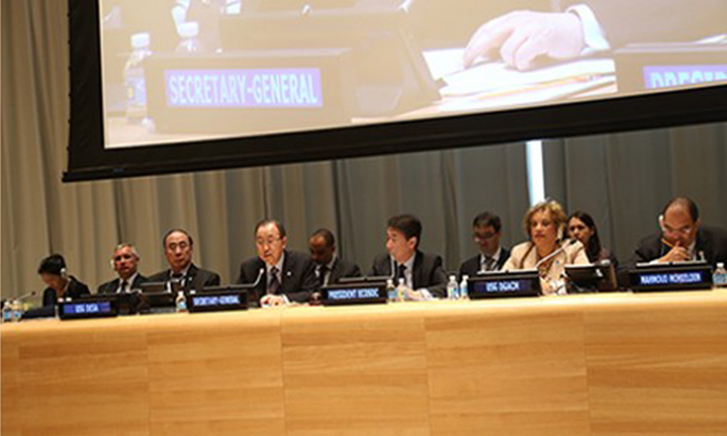
Inaugural ECOSOC forum pursues financing for development commitments
Following up to the adoption of three historic agreements to put the world on a path to sustainable development — the Addis Ababa Action Agenda, the 2030 Agenda for Sustainable Development and the Paris Agreement on climate change — the international community came together to discuss effective implementation that reaches all people.
“Implementation will be the test of our commitment,” UN Secretary-General Ban Ki-moon said during the inaugural ECOSOC forum on financing for development follow-up (FfD forum). “The Addis Agenda provides the foundation for a renewed and strengthened global partnership for sustainable development.”
Participants at the Forum called for strengthened cooperation in mobilizing all financial resources, as well as technological development and capacity-building, to accelerate progress in achieving the ambitious sustainable development agenda.
Held from 18 to 20 April in New York, the event brought together a large number of high-level participants, including 17 Ministers and Vice-Ministers, as well as numerous government officials in the areas of finance, foreign affairs and development cooperation. The event also saw an unprecedented number of World Bank Group and IMF Executive Directors, senior UN officials and a strong representation of civil society organizations and the private sector.
They all called for strengthened cooperation to mobilize financial resources, as well as technological development and capacity-building, to accelerate progress in achieving the ambitious sustainable development agenda.
Opening the forum, the President of the Economic and Social Council, Oh Joon, said that the inaugural FfD forum marked a new chapter in the history of development cooperation. Mandated by the Addis Ababa Action Agenda (AAAA), the forum will serve as a primary platform for policy dialogue on financing for development follow-up. It is mandated to assess progress, identify challenges and facilitate the delivery of the means of implementation of the SDGs, promote the sharing of lessons learned at the national and regional levels, and address new and emerging topics of relevance.
“I trust that this forum will provide the right space for exchange on early action taken and will chart the road map for future implementation of the Addis Agenda,” Oh noted.
In his opening address, Ban Ki-moon outlined key challenges in financing sustainable development and stressed the need to sustain the political momentum that had led to the adoption of the 2030 Agenda for Sustainable Development, the Addis Ababa Action Agenda and the Paris Agreement on climate change in 2015.
“I urge each and every one of you to take action and show leadership,” Ban said. “We must all play our part in this global endeavor, from governments and international organizations, to financial and trade institutions, the private sector and civil society.”
Echoing the Secretary-General’s call for implementation, heads of major institutional stakeholders expressed their strong support for the launch of the FfD forum.
“We can all do something, wherever we have expertise,” said Christine Lagarde, Managing Director of the IMF.
As part of the inaugural segment, Wu Hongbo, Under-Secretary-General for Economic and Social Affairs, launched the first report of the Inter-agency Task Force (IATF) on Financing for Development, which had been convened in late 2015.
With more than 50 participating agencies from the UN system and beyond, the IATF will advise the intergovernmental follow-up processes on implementation gaps and recommendations for corrective action. The 2016 report focuses on how the Task Force proposes to monitor implementation of commitments made in the Addis Agenda in future years.
The FfD forum provided a solid platform for substantive deliberations on the three chapters of the AAAA, namely (1) a global framework for financing development post-2015, (2) seven action areas, and (3) data, monitoring and follow-up. To this end, it included six multi-stakeholder round tables, chaired by Ministers and moderated by heads of relevant institutions. In addition, a dedicated panel discussion was organized on the outcome of the Global Infrastructure Forum.
A salient feature of the FfD forum was the interactive dialogue with the representatives of intergovernmental bodies and senior management of the World Bank, IMF and UNCTAD on two themes: “Policy coherence in implementing the AAAA”; and “Humanitarian and development nexus”. The official programme of the FfD forum was complemented by a rich portfolio of side events (17), which allowed for presentation of diverse perspectives and supported the inclusive approach of the FfD process.
Participants welcomed early progress made in implementing of the AAAA, while also pointing out the implementation challenges given the current global context. Member States acknowledged the launch of the Global Infrastructure Forum, the establishment of the Technology Facilitation Mechanism and the upcoming signing of the Paris Agreement as important steps forward.
Developing countries expressed concern about the difficulties with domestic resources mobilization due to the declining commodity prices, increasing financial volatility and illicit financial flows. In this context, many delegations voiced strong support for strengthened international tax cooperation, with the United Nations playing a critical role, in collaboration with other relevant international organizations. The essential role of the ODA, particularly for the LDCs, was also stressed.
Following extensive informal consultations, Member States reached consensus on the outcome document of the forum, which reaffirms strong commitment to the full and timely implementation of the AAAA and the link between the AAAA and the 2030 Agenda for Sustainable Development. It also endorses the conclusions and recommendations of the IATF report and provides guidance for future sessions of the FfD forum.
As mandated by AAAA, the outcome of the 2016 FfD forum will be fed into the overall follow-up and review of the implementation of the 2030 Agenda in the High-level Political Forum on Sustainable Development, to be held in July.

Follow Us